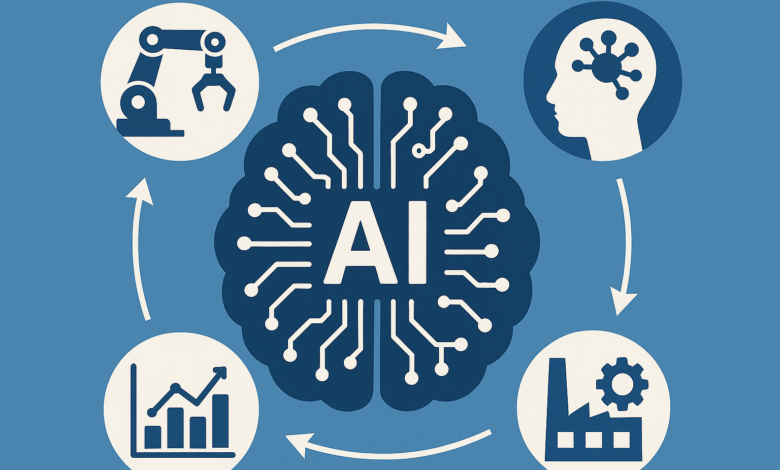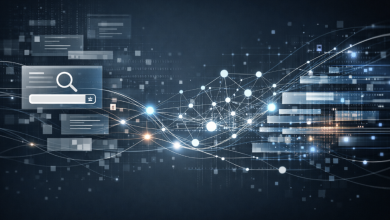
AI Is No Longer a Future Concept; It’s Today’s Reality
Gone are the days of AI seeming like a far-off, futuristic concept. It’s become an operational reality embedded across nearly every industry. From the algorithms behind personalized playlists on Spotify to predictive models that optimize healthcare operations, AI is changing how businesses operate, how leaders make decisions, and how consumers experience the world around them.
We’ve entered a world where AI is not just augmenting daily tasks, it’s actively redefining them. From how we search online to how products are delivered to our doorsteps, AI touches almost every part of the modern value chain. Amid the buzzwords and fast-moving developments, the central question is: how do we make sense of these AI trends and transformations, ensuring they work for all of us?
Making AI Understandable and Actionable
As someone who bridges behavioral science, enterprise strategy, and advanced analytics into my daily work, my mission is to make AI and data science accessible, understandable, and actionable, whether you have a tech degree or not. One of the biggest misconceptions is that AI is only for engineers or data scientists. But understanding AI is becoming a fundamental skill, like digital literacy was a decade ago.
Across sectors, from finance and retail to healthcare and education, AI is more than just a tool; it’s a strategy, and it’s reshaping how organizations compete, innovate, and serve their stakeholders. The true value of AI emerges when it’s demystified and embedded thoughtfully into decision-making processes at every level of an organization.
Finance: Predictive Power and Human-AI Collaboration
In finance, AI trends have revolutionized the industry by enabling predictive precision at scale. Financial institutions were among the earliest adopters of AI due to the volume and complexity of the data they handle.
At J.P. Morgan Chase, for example, where I lead Marketing Data and Analytics, we use AI not just for operational efficiency, but to augment human decision-making. We integrate psychological insight with data science to create solutions that are intuitive and customer-centered. This fusion of data and behavior gives us a competitive edge—one where decisions are not just fast, but also empathetic and aligned with client needs.
Healthcare: Amplifying Human Expertise
Healthcare is another area undergoing a quiet revolution thanks to AI. Diagnostic tools powered by machine learning are detecting illnesses earlier and with greater accuracy.
Predictive models help hospitals reduce readmissions, and virtual assistants support patients in real time. AI is not about replacing doctors, it’s about amplifying their impact and reducing burnout.
In rural or underserved areas, AI-enabled mobile diagnostics and telemedicine tools are helping bridge gaps in care delivery, making healthcare more equitable and accessible.
Retail: Personalization at Scale
Retail and e-commerce platforms are already leveraging AI trends to create highly personalized customer experiences. From recommendation engines to dynamic pricing and smart chatbots, these innovations aren’t just boosting sales, they’re creating meaningful interactions that build loyalty and trust.
AI’s ability to synthesize browsing history, purchase patterns, and even social media behavior allows brands to meet consumers exactly where they are, emotionally and contextually. That level of personalization, once impossible at scale, is now table stakes for market leaders.
Manufacturing and Logistics: Intelligent Efficiency
In manufacturing and logistics, AI is powering predictive maintenance, robotics, and smart supply chains. These systems reduce downtime, enhance precision, and optimize distribution in real time, ushering in the age of Industry 4.0.
Factories are evolving into interconnected digital ecosystems, where real-time feedback loops enhance productivity while conserving resources. AI isn’t just optimizing operations, it’s helping to make production more sustainable and resilient.
Education: Personalizing Learning
Education, too, is being transformed by AI trends. Adaptive learning platforms tailor content to each student’s pace and needs. AI-powered tutors and grading tools save time and improve outcomes, offering a more inclusive and personalized education experience.
Students who once fell behind due to rigid systems can now benefit from learning journeys built around their individual strengths. Meanwhile, educators are empowered to focus more on mentorship, creativity, and support.
Government and Smart Cities: Building Better Systems
Governments and municipalities are beginning to explore AI’s potential through smart city initiatives. From chatbots for public services to environmental monitoring and traffic management, AI is helping create more efficient, responsive, and sustainable communities.
Real-time analytics are informing everything from emergency response to energy consumption, enabling cities to act with agility and foresight. These advances are about convenience, as well as urban equity and the community’s quality of life.
Emerging Trends: The Next AI Frontier
Generative AI, multimodal systems, and agentic tools represent the next wave of AI trends and innovation. These technologies expand what’s possible in content creation, diagnostics, and proactive digital assistants. But with this progress come new challenges, especially around ethics and governance.
As AI grows more autonomous, our frameworks for oversight must grow just as sophisticated. The frontier isn’t just technical; it’s philosophical and deeply human.
Ethics and Accountability Must Lead the Way
With any powerful technology comes responsibility. We must be transparent about how AI systems are designed and deployed. Issues like fairness, bias, and accountability must be core to every conversation and implementation effort.
Ethical AI isn’t a checkbox. It’s an ongoing dialogue. And that dialogue must include diverse voices, including those historically excluded from tech development. Only then can we build systems that reflect society’s full complexity.
Human-Centered Innovation Is the Key
As both a psychologist and a data executive, I believe the most meaningful progress comes from blending technical excellence with behavioral understanding. AI should serve people, not the other way around. That means constantly asking who benefits from these tools, and whether they reinforce or reduce bias.
True innovation doesn’t just automate the status quo. It reimagines what’s possible in a way that honors human dignity, creativity, and purpose.
You Don’t Need to Be a Technologist to Lead in the AI Era
You don’t need to write code or build neural networks to succeed in this AI-driven world. What you need is curiosity, data literacy, and the ability to ask insightful questions. AI trends are already shaping every industry, and every life.
We all have a role to play, whether as users, advocates, builders, or watchdogs. The skills that matter most are those that help us navigate ambiguity, connect disciplines, and lead with clarity. The real opportunity lies in actively helping shape what comes next.




